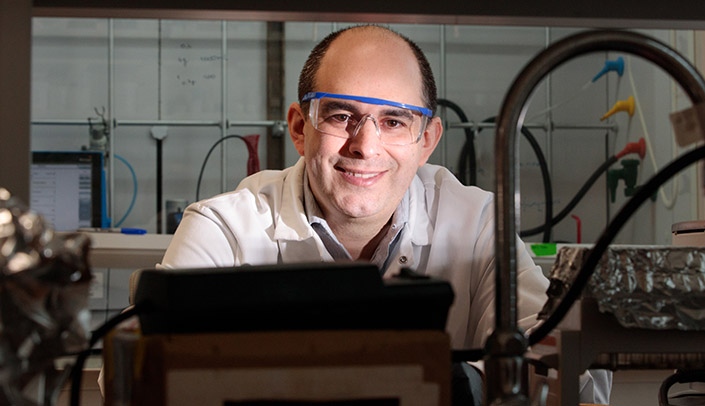Imagine this situation: You go to the clinic, and they run some tests to analyze your condition. Then, a physician consults a computer program to see which biomaterials, put together which way, would best treat your disease. Basically, an on-demand nanotechnology therapy tailored to the needs of that individual patient.
Now imagine that one day you do not need to imagine this. That’s what Martin Conda Sheridan, Ph.D., assistant professor of pharmaceutical sciences in the UNMC College of Pharmacy, is working on.
The project recently won him the prestigious Faculty Early Career Development Program or CAREER award — $567,000 over five years — from the National Science Foundation (NSF). The accolade recognizes promising early-career scientists — and Dr. Conda Sheridan is the first CAREER award winner from UNMC since Sasha Kabanov, Ph.D., D.Sc., in 1995.
Scot Ouellette, Ph.D., associate professor of pathology and microbiology, recently brought a CAREER grant with him, when he joined UNMC in 2017. But Dr. Conda Sheridan is the first in 25 years to earn the honor for his work here.
Dr. Conda Sheridan’s goal is to merge material sciences and medicinal chemistry — essentially, he and his lab are working to create tiny nanostructures that will interact with our bodies in ways which improve human health.
The first objective of his CAREER-winning project is to create new nanostructures of two types: those sensitive to different conditions in the human body; and, a second set, resistant to physiological changes, to remain constant in intestinal and gastric fluids. Why? To find the “smartest” and most effective way of delivering drug therapies within the human body.
The second objective is to take these findings in order to create computer software that will allow scientists and clinicians to predict the shape and behavior of these new nanostructures when introduced within the human body. Mario Tagliazucchi, Ph.D., at the University of Buenos Aires, is a key collaborator here.
Third, Dr. Conda Sheridan and team will create nanostructures responsive to free radicals, which are linked to aging, illness and oxidative stress. The study of this interaction will likely prove essential to creating “smart” therapies for health conditions associated with inflammation — including cancer.
They’ll study the properties of biomaterials composed of biocompatible and innocuous components, like natural amino acids, fatty acids, and sugars. In addition to being safe for the human body, these biomaterials have the ability to form nanostructures of a variety of different shapes.

Congratulations!
Congratulations, Martin! Well deserved.
Congratulations Dr. Conda Sheridan. We, in Environmental Health and Safety, are proud to assist and support your work.
That's amazing. Congratulations Martin! It's not easy to get these NSF awards, a very proud moment indeed.
Congratulations Martin. Best wishes from everyone at the Electron Microscopy Core Facility
Well done Martin!
Congratulations Dr. Martin!
Way to go, Martin! Wonderful news! Hearty Congratulations!!
Wonderful news, Martin! Congratulations.
Congratulations Dr Conda Sheridan
Way to go!
Dr. Conda Sheridan – congratulations sir. I look forward to seeing this work progress in the coming years. Your work is inspiring.